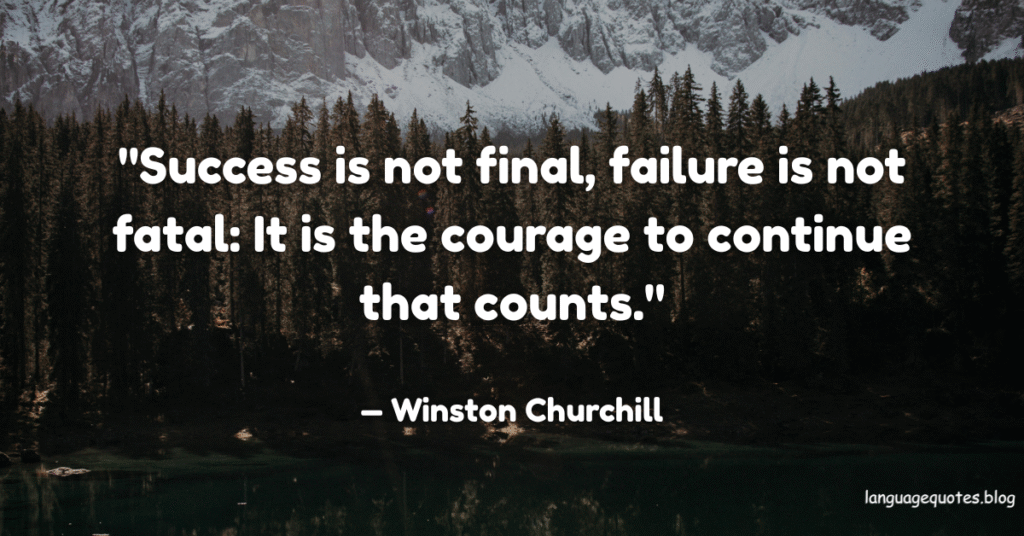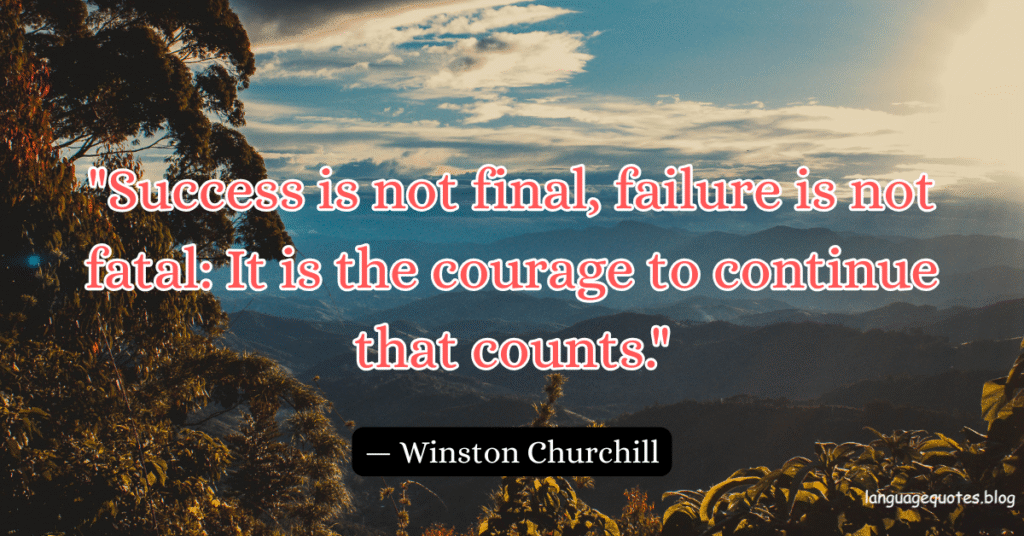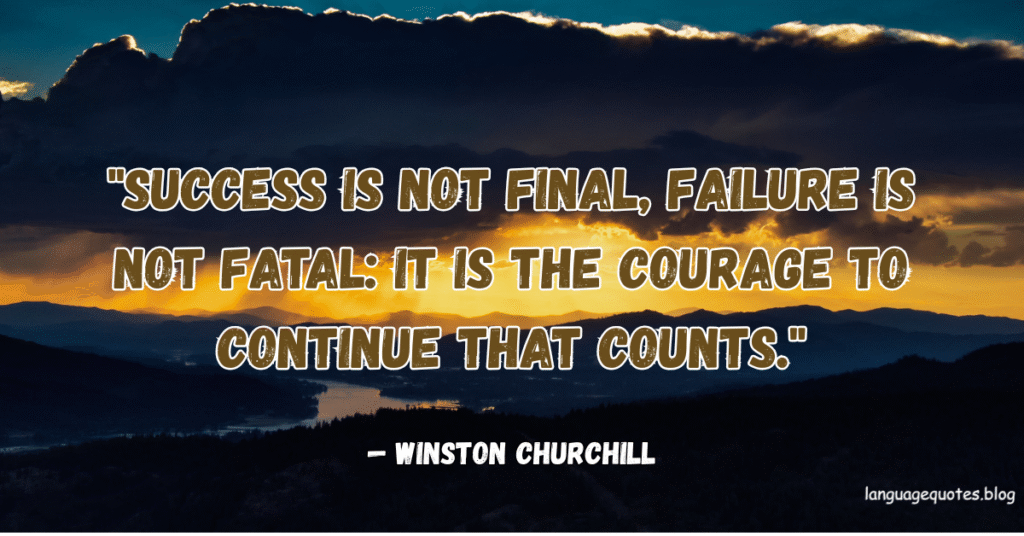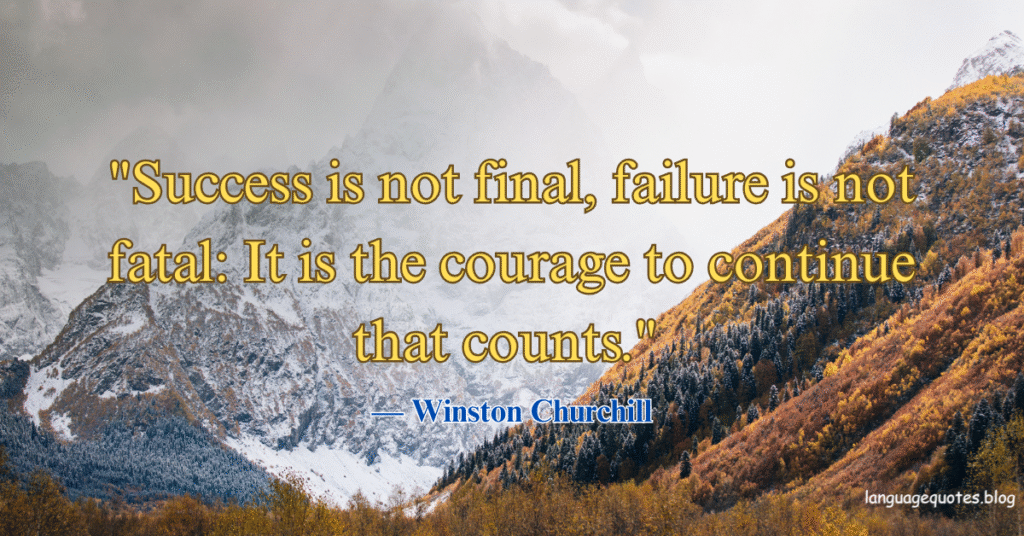



“Success isn’t final, failure isn’t fatal: It is the courage to continue that counts.”
— Winston Churchill
This enduring quotation by Winston Churchill, one of the most influential leaders in history, serves as a powerful reminder that life is not defined by a single victory or defeat. Rather, it is shaped by resilience, perseverance, and the unwavering will to keep moving forward. Churchill, who led Britain through its darkest hours during World War II, understood better than most that progress is rarely a straight path. Success can be fleeting, and failure is often inevitable—but what truly matters is the courage to press on.
This quote resonates across generations, professions, and personal struggles because it speaks to a universal truth: success and failure are temporary, but perseverance is eternal.
The Temporary Nature of Success
“Success isn’t final” is a humbling reminder that achieving your goals—no matter how grand they may be—doesn’t signal the end of your journey. Too often, people believe that reaching success marks a finish line. In reality, it’s merely a milestone. Resting too long on your accomplishments can lead to stagnation, and in a world that constantly evolves, yesterday’s success may not sustain you tomorrow.
Churchill’s words encourage us to view success as a step, not a destination. Whether it’s a business win, an academic achievement, or a personal breakthrough, every success brings new challenges. Sustaining it requires continuous effort, learning, and adaptability.
The Lessons Within Failure
“Failure isn’t fatal.” These four words bring hope to anyone who has stumbled or fallen short. Failure is not the end of your story. It isn’t a final judgment on your worth or potential. Instead, it’s a crucial part of the learning process. Every failure carries a lesson—if you’re open to finding it.
Churchill himself experienced many political defeats. He was voted out of office, criticized for decisions, and doubted by many. Yet he never let failure define him. Instead, he treated each setback as a lesson, a step toward becoming stronger and more prepared. That mindset—learning from failure rather than fearing it—is key to achieving long-term success.
Courage Is the Constant
“It is the courage to continue that counts.” This is the heart of Churchill’s message. Success and failure are both transient, but courage is the constant that sustains us through all of it. Courage doesn’t mean being fearless; it means taking action even when fear is present. It’s the inner strength that fuels persistence.
This quote calls on each of us to cultivate that kind of courage. Whether you’re navigating a career challenge, overcoming personal hardship, or facing the unknown, what truly matters is the decision to keep going.
Relevance in All Areas of Life
Churchill’s wisdom applies across every facet of life:
- In education, it reminds students that a bad grade isn’t the end, and even top marks aren’t the final goal.
- In business, it encourages entrepreneurs to embrace setbacks as part of innovation and growth.
- In personal development, it teaches that real success comes not from never failing, but from rising after each fall.
- In mental health, the quote offers deep comfort. For those battling depression, anxiety, or trauma, continuing each day is an act of quiet, powerful bravery.
In each context, the quote serves as a guide for how to endure—and thrive—through ups and downs.
Changing Your Perspective
One of the most transformative aspects of this quote is its ability to shift our mindset. Society often portrays success and failure as binary opposites—either you’ve made it or you’ve failed. Churchill reminds us that both are fleeting, and that our attitude toward them is what truly matters.
By adopting this mindset, we free ourselves from the fear of failure and the pressure of perfection. It empowers us to take risks, grow through mistakes, and keep moving toward our goals.
Practical Ways to Apply This Quote
Here are simple, practical steps to bring Churchill’s wisdom into your daily life:
- Redefine success as a lifelong journey. Celebrate wins, but remain open to growth.
- Reframe failure as valuable feedback. Ask yourself, “What can I learn? How can I improve?”
- Build resilience through healthy routines—exercise, mindfulness, journaling, or regular reflection.
- Surround yourself with support—mentors, friends, and communities who encourage persistence.
- Practice courage by doing small, brave things daily—speaking up, starting something new, or simply getting up after a tough day.
Conclusion
“Success isn’t final, failure isn’t fatal: It is the courage to continue that counts.” Winston Churchill’s words go beyond inspiration—they offer a practical philosophy for living. Whether you’re riding the highs of success or weathering the storms of defeat, remember that neither condition is permanent. What defines your journey is the strength to continue moving forward.
So when you face uncertainty, rejection, or exhaustion, let these words guide you. Your courage to take the next step may be the most powerful tool you have. And in that act of continuing, you embody the very essence of resilience.






